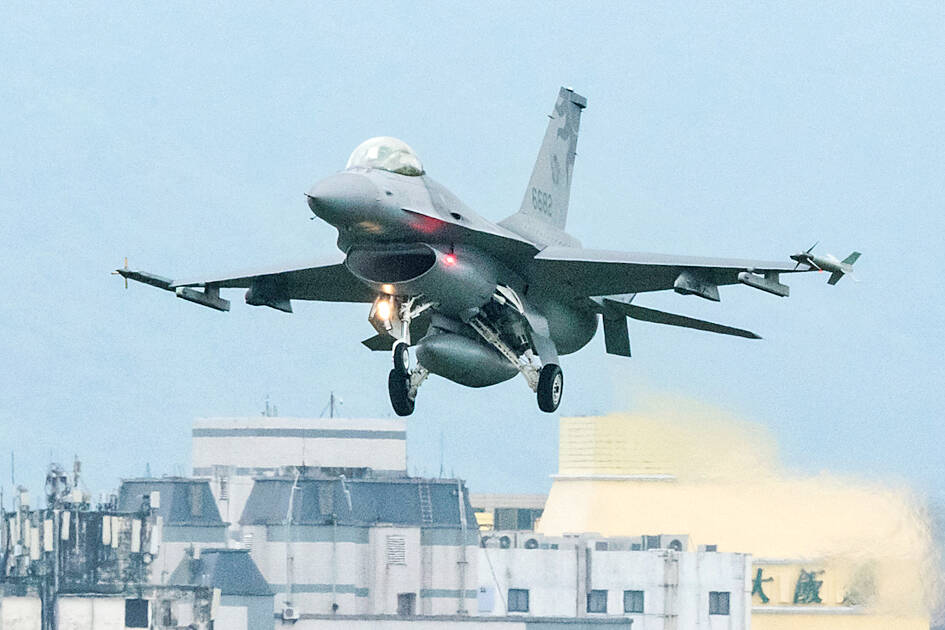The US Department of State has approved two potential sales to Taiwan of F-16 parts and related equipment worth a total of US$300 million, the Pentagon announced on Wednesday.
The deals would represent the 14th arms sale to Taiwan since US President Joe Biden took office in 2021.
In two press releases, the Pentagon’s Defense Security Cooperation Agency said the packages would include standard (US$220 million) and non-standard (US$80 million) spare and repair parts, components, consumables and accessories for F-16 aircraft, as well as other technical and logistics support services.

Photo: Yasuyoshi Chiba, AFP
The proposed sales would “improve [Taiwan’s] ability to meet current and future threats by maintaining the operational readiness of [Taiwan’s] fleet of F-16 aircraft,” the agency said.
They would also help improve the security of the nation and assist in maintaining political stability, military balance and economic progress in the region, it said.
The agency said it had notified the US Congress of the potential sales.
The approval does not indicate that a contract for the equipment has been signed.
The Ministry of National Defense yesterday said that the sales would help maintain Taiwan’s combat capabilities as the Chinese Communist Party continues to suppress Taiwan’s air and maritime training space and response time through “gray zone” tactics, restricting the nation’s right to self defense.
The ministry urged China to cease “all irrational actions” against Taiwan, saying that stability in the Strait requires the joint efforts of both sides.
Asked about Biden’s repeated remarks about defending Taiwan and his administration’s approval of arms sales, Minister of National Defense Wellington Koo (顧立雄) said the remarks show the importance of Taiwan.
The nation needs to enhance its self-defense capabilities, he said.
“Judging from Biden’s past remarks, we can see the importance of Taiwan, as well as that the peace and stability across the Taiwan Strait are indispensable to maintaining global peace and prosperity,” Koo said.
“Taiwan must first bolster its self-defense capabilities and become a force for deterrence by joining the US Indo-Pacific strategy. This is a crucial task of the defense ministry,” he addded.
Meanwhile, the Taiwan-US Defense Industry Symposium opened in Taipei yesterday.
There has been speculation that US defense contractors participating in the forum are to meet with defense ministry officials to talk about details of the arms sales, apart from visiting the Chungshan Institute of Science and Technology and Aerospace Industrial Development Corp (漢翔航空工業).
“The forum is an event for exchange among businesses in the private sector and it has nothing to do with arms sales,” Koo said.
Additional reporting by Shelley Shan

The US government has signed defense cooperation agreements with Japan and the Philippines to boost the deterrence capabilities of countries in the first island chain, a report by the National Security Bureau (NSB) showed. The main countries on the first island chain include the two nations and Taiwan. The bureau is to present the report at a meeting of the legislature’s Foreign Affairs and National Defense Committee tomorrow. The US military has deployed Typhon missile systems to Japan’s Yamaguchi Prefecture and Zambales province in the Philippines during their joint military exercises. It has also installed NMESIS anti-ship systems in Japan’s Okinawa

TRAGEDY STRIKES TAIPEI: The suspect died after falling off a building after he threw smoke grenades into Taipei Main Station and went on a killing spree in Zhongshan A 27-year-old suspect allegedly threw smoke grenades in Taipei Main Station and then proceeded to Zhongshan MRT Station in a random killing spree that resulted in the death of the suspect and two other civilians, and seven injured, including one in critical condition, as of press time last night. The suspect, identified as a man surnamed Chang Wen (張文), allegedly began the attack at Taipei Main Station, the Taipei Fire Department said, adding that it received a report at 5:24pm that smoke grenades had been thrown in the station. One man in his 50s was rushed to hospital after a cardiac arrest

‘WIN-WIN’: The Philippines, and central and eastern European countries are important potential drone cooperation partners, Minister of Foreign Affairs Lin Chia-lung said Minister of Foreign Affairs Lin Chia-lung (林佳龍) in an interview published yesterday confirmed that there are joint ventures between Taiwan and Poland in the drone industry. Lin made the remark in an exclusive interview with the Chinese-language Liberty Times (the Taipei Times’ sister paper). The government-backed Taiwan Excellence Drone International Business Opportunities Alliance and the Polish Chamber of Unmanned Systems on Wednesday last week signed a memorandum of understanding in Poland to develop a “non-China” supply chain for drones and work together on key technologies. Asked if Taiwan prioritized Poland among central and eastern European countries in drone collaboration, Lin

ON ALERT: Taiwan’s partners would issue warnings if China attempted to use Interpol to target Taiwanese, and the global body has mechanisms to prevent it, an official said China has stationed two to four people specializing in Taiwan affairs at its embassies in several democratic countries to monitor and harass Taiwanese, actions that the host nations would not tolerate, National Security Bureau (NSB) Director-General Tsai Ming-yen (蔡明彥) said yesterday. Tsai made the comments at a meeting of the legislature’s Foreign Affairs and National Defense Committee, which asked him and Minister of National Defense Wellington Koo (顧立雄) to report on potential conflicts in the Taiwan Strait and military preparedness. Democratic Progressive Party (DPP) Legislator Michelle Lin (林楚茵) expressed concern that Beijing has posted personnel from China’s Taiwan Affairs Office to its